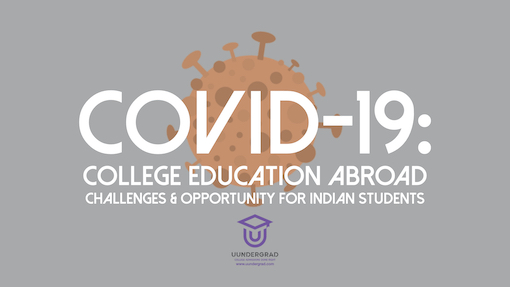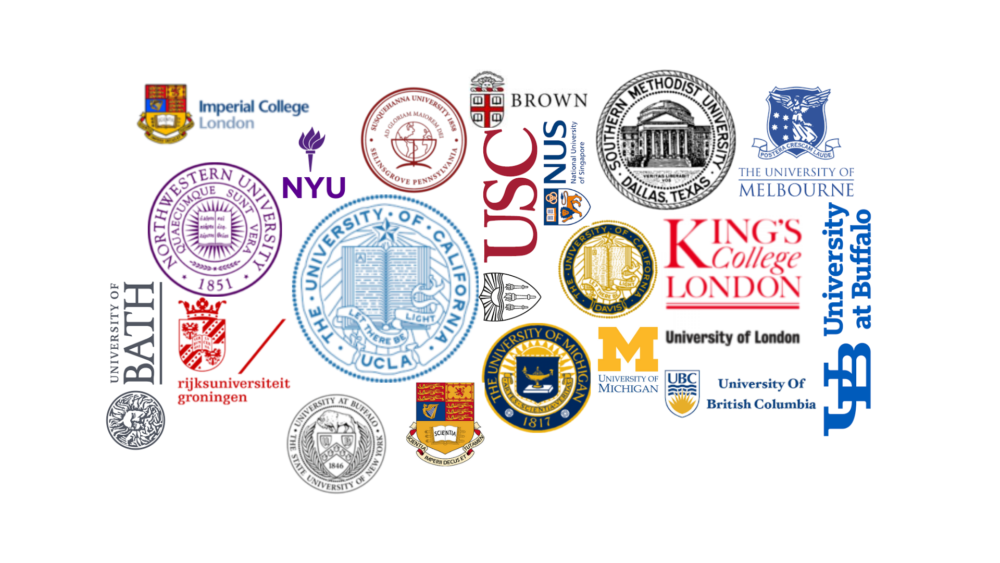COVID-19: COLLEGE EDUCATION ABROAD – CHALLENGES & OPPORTUNITY FOR INDIAN STUDENTS
When the aftermath of Covid-19 settles down, and I sincerely hope it happens soon, most of us will be adapting to live in what is being called “the new normal”. Less going out, more work from home, less spending on luxury, more focus on hygiene and health, and much more.
Amidst this ongoing chaos, there are a a number of parents with kids in Grades 11/12, and in Grades 8/9/10, who are obviously anxious about their kids college education, specially those considering their undergraduate (Bachelors) education from abroad. The ones who have completed/are completing their Grade 12 this summer, have some very pressing and timely decisions to make regarding “what next”!
Every year, more than 100,000 students from India go abroad for an undergraduate degree – a number up from 50,000 six years. USA, Canada, Australia, & the UK account for the largest chunk, though the last decade has seen an increasing acceptance for Singapore, Germany, Netherlands and UAE (campuses from the mainstream universities in western countries here are a big draw). The answers for this upswing in “why undergrad education abroad” falls within a combination of:
- Superior quality of education
- Increasing affluence & affordability
- Propensity for going (& hopefully settling) abroad
- Limited & complex choices in india
- Desire for a global exposure
Now with Covid-19 upon us, how much of this is likely to change? Not much will, according to me, and the above five reasons will remain as robust – as the tangible & intangible value, high aspirations and strong desirability of an international education will continue. What will somewhat change is the “Is it really worth it?” question, specially in current scenario of fear, uncertainty & vulnerability, as things stabilise over the next 6-18 months post Covid-19.
While both the universities/colleges and the students are still trying to figure out their plans, lets look at how the next 1-5 years are most likely to pan out for undergraduate college education.
Students For The Fall 2020 Session:
- Fall 2020 will be a challenge – of execution, as much as of the mind. Many countries are still closed or at least quasi closed, though some signs of opening up are emerging across many.
- Education institutions will probably be amongst the last to be opened – given their density and close proximity of interactions amongst the students – it can be a hotspot for quick transmission of Covid-19.
- Visa situation will remain uncertain for the next few weeks/months, and thus many universities are gearing up for a full online semester. Or a hybrid (physical + online) model. It’s a major WIP, and as of now no one really knows what that will look like.
- Some universities will consider beginning the semester later than usual, in October or November. Others may help to create a structured gap year, reducing the number of courses offered on campus and increasing the number of courses taught online.
- Some will opt to defer admissions for international students to Spring 2021 or even Fall 2021, which may mean a forced gap year for some students.
- This may not be a bad thing though challenging, as many typical gap year activities travel, interning, volunteering, etc. will be limited in availability and scope given the various ramifications of Covid-19.
- If universities & colleges do open back up, I would recommend for those who can go, to do so.
Admissions Process & Context For The 2021 Session:
- Assuming the chaos subsides significantly over the next 6-12 months, the admission process for next year (Fall 2021) may see minor changes in the process, as well as some changes in the content and context.
- Universities will still rely on a combination of academic results, test scores, letter of recommendations, essays, etc. Though, given the challenges of taking the SAT/ACT, some US colleges and universities are going “the SAT/ACT not required” route.
- Some families will defer their kids college process due to various issues they may be facing. Coupled with the international uncertainty, overall application numbers will probably come down for some universities.
- That may lead the acceptance rates to move positively for the students, though this is unlikely to impact much at the top notch schools. But do expect somewhat better admissions results at many universities.
- Top schools like Harvard, Oxford, Stanford and such are likely to remain just as selective as they have ever been, but schools that are a few notches below in selectivity could see some impact to their applicant pool. Overall acceptance rates will become slightly better for students, specially the international ones.
- The application process for the 2021 session starts in a couple of months, so get cracking now – researching, testing, writing your essays, organising your LORs, if you haven’t already!
For Students Beyond 2021 Session:
- Things will get back to normal in this area one way or another. Changes to the “delivery of education” will come as universities figure out the right hybrid model. This impact will be primarily on the delivery of the lesson – online vs physical, but be very aware that a college education goes much beyond the academics.
- Covid-19 may accelerate the end of the traditional semester-based system – the Gen Z student is used to being online, all the time. One of the hybrid models maybe an academic year of 12 months and combine the best of in-person and online learning.
- Universities can also consider the possibility of designing separate courses for residential and online students, along with allowing students to take one or two courses at a time for three or four weeks.
- Some small colleges and universities will face issues of sustenance & survival, as almost all universities rely on tuition money as their primary source of revenue. As that avenue gets impacted we may see certain universities and colleges shutting down in the next 2-5 years, and some merging. This will have little, if any, impact on most of the “ranked” colleges and universities. Though, if and when universities do shut down, it will reduce the total pool of seats available, thereby having some impact on acceptance numbers.
- For the universities & colleges that survive Covid-19, many will likely see lower revenues and higher costs. Schools should continue to prioritise their people as budgets are reduced. The 2008 recession taught us that relying on layoffs to balance university budgets is a quick way to kill innovation, risk taking & morale.
- “In 1665, Cambridge University closed because of the plague. Isaac Newton decided to work from home. He discovered calculus and the laws of motion. Just saying,” said Paddy Cosgrave, chief executive of Web Summit. There may be some surprising silver linings through this chaos – lets remain hopeful.
- Start preparing early if you’re looking for an undergrad college education abroad – Grade 9 is an ideal time. Initiate the planning & start working on the various elements that impact admissions – academics, extra curricular, leadership, social wok, projects, essays, testing, LORs – it IS a long list you have to tackle.
Importance Of An Undergraduate College Degree:
- There is a long and never ending debate on the “value”of an undergraduate college degree from abroad. Each side of the argument has its merits and in the end it really boils down to an individual or family perspective and opportunity.
- My view on this has been “it’s quite worth it”, for five key reasons – superior academic approach & execution, more hands on learning & experience, better overall development through various opportunities available, a global exposure of living in a new country, and a super global network that stays for life.
- The true value of a college degree is just not the degree or the academic learning – there are many other important factors at play that help shape the young student into a true adult.
- Outside of the core academic value proposition, one of the biggest factor is one is learning and practising responsibility – the ability to take steps into true adulthood, world life & choices/consequences is what becomes the cornerstone of a college education. A truly good college experience helps provide that very well – and is the one area international colleges & universities excel in.
- College is also about the whole list of other things like extra curricular pursuits, project work, internships, social activities, working in teams, making friends, getting into trouble (hopefully not) & getting out of it.
- I believe that the physical aspect of college will continue to remain an important – for some courses online only is just not an option, and for many others there is much more to the academic experience than just being about online lectures and online assignments.
- Continue focus on what you (or your kid wants), do lots of research, get specialised help, explore your options & get ready easy for the challenging, yet interesting college abroad admission process.




